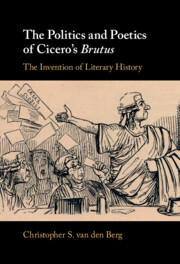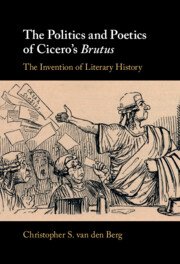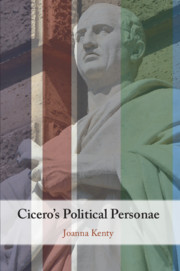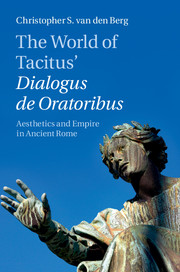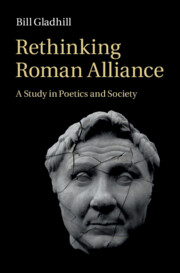The Politics and Poetics of Cicero's Brutus
Cicero's Brutus (46 BCE), a tour-de-force of intellectual and political history, was written amidst political crisis: Caesar's defeat of the republican resistance at the battle of Thapsus. This magisterial example of the dialogue genre capaciously documents the intellectual vibrancy of the Roman Republic and its Greco-Roman traditions. This book is the first study of the work from several distinct yet interrelated perspectives: Cicero's account of oratorical history, the confrontation with Caesar, and the exploration of what it means to write a history of an artistic practice. Close readings of this dialogue-including its apparent contradictions and tendentious fabrications-reveal a crucial and crucially productive moment in Greco-Roman thought. Cicero, this book argues, created the first nuanced, sophisticated, and ultimately 'modern' literary history, crafting both a compelling justification of Rome's oratorical traditions and also laying a foundation for literary historiography that abides to this day.
- Closely examines the rhetoric of a Roman dialogue to uncover its intellectual and political complexity
- Considers the political difficulties individuals face in a time of civic crisis
- Argues for an important if overlooked milestone in the history of literary theory and literary historiography
Reviews & endorsements
‘a fine study … Recommended.’ A. M. Keith, Choice Connect
‘… van den Berg’s book is an ambitious, well-argued, and timely work that offers a wealth of approaches to a challenging text with a complex reception history. Like the Brutus itself, it deftly straddles the often-siloed disciplines of history and literary criticism to provide valuable insight into the confluence of art and politics at a critical point in the story of Rome.’ Noah Segal, Bryn Mawr Classical Review
‘Anyone who has spent time with Cicero’s Brutus will discover much to interest them in this book. It is also an important contribution to the study of ancient literary criticism, and makes a strong case for including Cicero as an innovative voice within that genre (as he certainly should be). … I would highly recommend this book to anyone who wants to understand how Cicero’s choices over two thousand years ago still shape the way we think about literary history today.’ Caroline Bishop, GNOMON
Product details
September 2021Hardback
9781108495950
348 pages
235 × 159 × 20 mm
0.59kg
Available
Table of Contents
- Introduction
- 1. Ciceropaideia
- 2. The intellectual genealogy of the Brutus
- 3. Caesar and the political crisis
- 4. Truthmaking and the past
- 5. Beginning (and) literary history
- 6. Perfecting literary history
- 7. Cicero's Attici
- 8. Minerva, Venus, and Cicero's judgments on Caesar's style
- Conclusion.

